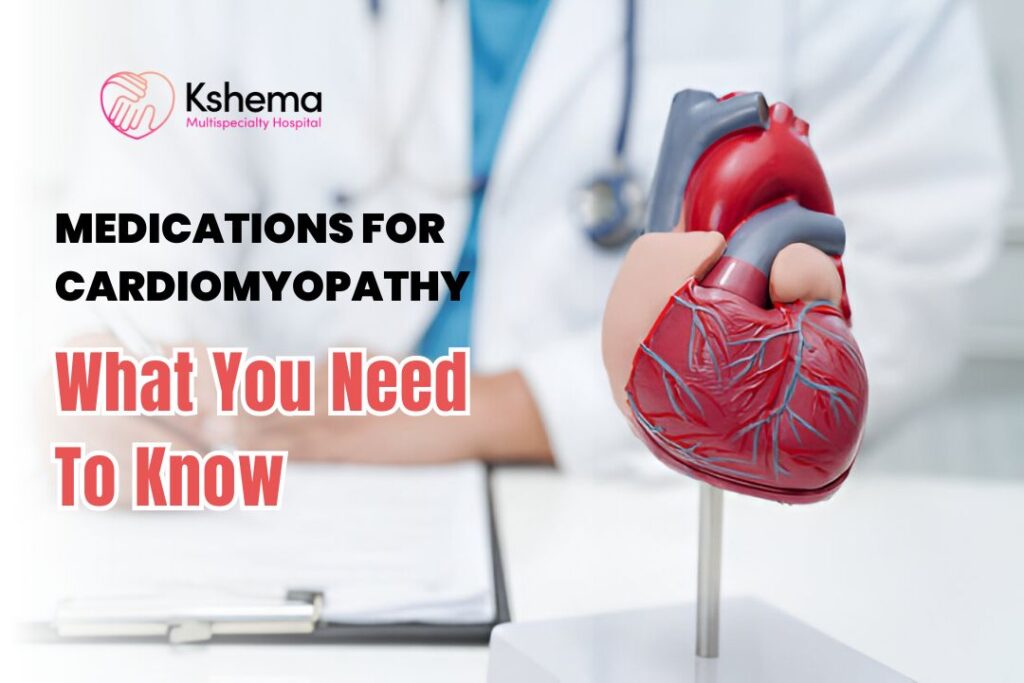Cardiomyopathy is a serious condition that affects the heart muscle, making it harder for the heart to pump blood efficiently. This can lead to heart failure, arrhythmias, and other complications if not managed properly. Genetic factors, infections, high blood pressure, or other underlying health conditions can cause cardiomyopathy, but various treatments help manage symptoms and improve quality of life. One of the key components of treatment is medication, which plays a crucial role in controlling symptoms, slowing disease progression, and preventing complications.
This article provides an in-depth look at the different types of medications used to treat cardiomyopathy, their benefits, and how they contribute to overall heart health. Whether you or a loved one receives a cardiomyopathy diagnosis, understanding these medications helps you make informed treatment decisions.
Common Medications for Cardiomyopathy
- Angiotensin-Converting Enzyme (ACE) Inhibitors: These medications help relax blood vessels, reducing blood pressure and decreasing the heart’s workload. They are standard treatments for conditions like dilated cardiomyopathy.
- Beta-Blockers: Beta-blockers slow the heart rate and reduce blood pressure, which can help prevent arrhythmias and improve heart function. They are commonly used in various forms of cardiomyopathy.
- Diuretics: Diuretics help remove excess fluid and sodium from the body, alleviating symptoms such as swelling and shortness of breath associated with heart failure.
- Aldosterone Antagonists: These medications help the body get rid of extra salt and fluid, which can help reduce symptoms and prevent hospitalizations in people with certain types of cardiomyopathy.
- Antiarrhythmic Drugs: These medications are used to control irregular heartbeats, which can be a complication of cardiomyopathy.
- Anticoagulants (Blood Thinners): Patients with certain types of cardiomyopathy may be at risk of developing blood clots, increasing the chances of stroke or heart attack. Blood thinners help reduce this risk by preventing clot formation.
- Digoxin: This medication helps strengthen heart contractions and is often used for patients with heart failure related to cardiomyopathy.
- SGLT2 Inhibitors: Originally developed for diabetes management, these drugs have been found to benefit patients with heart failure, including those with cardiomyopathy, by improving heart function and reducing hospitalization rates.
Lifestyle and Additional Therapies
In addition to medications, lifestyle modifications play a vital role in managing cardiomyopathy. Patients are often advised to:
- Maintain a heart-healthy diet, low in sodium and saturated fats.
- Engage in regular, doctor-approved exercise.
- Avoid alcohol and tobacco, as they can exacerbate heart conditions.
- Monitor fluid intake to prevent excess fluid retention.
- Manage stress through relaxation techniques such as yoga or meditation.
Cardiomyopathy Treatment in Bangalore
For individuals seeking specialized care for cardiomyopathy in Bangalore, several reputable multispecialty hospitals offer comprehensive cardiac services:
- Kshema Hospitals: A leading multispecialty hospital in Bangalore, Kshema Multispecialty Hospital provides advanced cardiology treatments, including specialized care for cardiomyopathy. Expert cardiologists and state-of-the-art facilities make the hospital renowned for its excellence in cardiac care.
- Other Leading Hospitals: Bangalore is home to various well-equipped cardiac hospitals that provide expert care for cardiomyopathy patients, ensuring the best possible treatment and management plans.
Advanced Treatment Options
In cases where medications and lifestyle changes are not enough, additional treatments may be necessary, such as:
- Implantable Cardioverter Defibrillator (ICD): This device helps regulate heart rhythms and prevents sudden cardiac arrest.
- Cardiac Resynchronization Therapy (CRT): Used for heart failure patients with irregular heart rhythms, CRT improves heart function by coordinating the contractions of the heart chambers.
- Heart Transplant: In severe cases, where other treatments fail, a heart transplant may be the only viable option.
Conclusion
Medications play a crucial role in managing cardiomyopathy, aiming to control symptoms, improve heart function, and prevent complications. If you or a loved one is dealing with cardiomyopathy, it’s essential to consult with a healthcare professional to determine the most appropriate treatment plan. For those in Bangalore, Kshema Multispecialty Hospital offers specialized care tailored to individual needs, ensuring the best possible outcomes for cardiac patients. With expert cardiologists, cutting-edge technology, and a patient-centered approach, Kshema Multispecialty Hospital remains a trusted name in cardiac care.




One Response